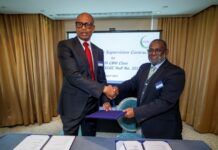A report by Human Rights Watch (HRW) has revealed that before the outbreak of the COVID-19 pandemic, sub-Saharan African countries had the highest adolescent birth rates in the world.
This is contained in a statement entitled ‘Africa: Rights progress for pregnant students.’
It reported that increases in teenage pregnancies were linked to poverty leading to transactional sex, lack of access to sexual and reproductive health services, and an increase in sexual violence.
The report stated that Sierra Leone has one of the highest teenage pregnancy rates in Africa, with profound consequences for girls’ education: in 2017, 30 percent of women ages 20 to 24 had a live birth before they turned 18.
“An estimated 20 per cent of girls drop out of school due to pregnancy and child marriage, according to government data,” said the report.
According to the report, the management of the Covid-19 pandemic in many African countries frequently led to prolonged school closures, widespread lack of remote learning options, and limited access to safe spaces for young people.
“These conditions exacerbated sexual and gender based violence, and significantly disrupted children and young adults’ access to key sexual and reproductive health services, potentially contributing to increases in teenage pregnancies.
“Countries in East and Southern Africa have registered high rates of teenage pregnancies.
“A study of the Southern African Development Community (SADC) countries, led by MIET Africa, a regional organization, shows that between October 2020 and February 2021, six SADC countries – Lesotho, Madagascar, Malawi, Namibia, Zambia, and Zimbabwe – have all recorded high rates of child, early and forced marriages, early pregnancies, and school dropouts.
“Increases in teenage pregnancies reported were linked to poverty leading to transactional sex, lack of access to sexual and reproductive health services, and an increase in sexual violence.
“Three out of five students surveyed lost access during the pandemic to important sexual and reproductive health services, including to health checkups, condoms and other contraceptives, and anti-retroviral treatment. One out of five youths surveyed was aware of at least one pregnant girl or a young mother under 24 who had given birth during the past six months.
“In South Africa, teenage pregnancy rates increased nationally, and in most provinces, from April 2020 and March 2021, compared with previous years. Seven out of nine South African provinces reported higher delivery rates among girls and young women ages 10 to 19, compared with the previous year, according to data from the Department of Basic Education. Gauteng province registered more than 23,000 pregnancies of girls ages 10 to 19, according to data published by the province’s department of health,” HRW reported.
Meanwhile, the organisation said African countries have taken important steps in recent years to protect the right to education of pregnant students and adolescent mothers, as five more sub-Saharan countries act to protect girls’ education while barriers remain.
It said since 2019, at least five sub-Saharan African countries – Mozambique, Zimbabwe, Sierra Leone, Uganda, and São Tomé e Príncipe – have either revoked restrictive or discriminatory policies or adopted laws or policies that allow pregnant students and adolescent mothers to stay in school under certain conditions.
“More African governments are taking stronger actions to support the rights of girls to education.
But many girls still have to fight against enormous government-imposed barriers that deny them their right to education and make schools turn their backs on them when they most need support,” said a senior children’s rights researcher at Human Rights Watch, Elin Martinez, “
HRW stated that the Covid-19 pandemic has led to an increase in teenage pregnancies in many African countries, according to United Nations, media, and civil society reports. This increase could be linked to prolonged school closures – all African countries closed their schools in 2020 – and lack of remote learning opportunities during the pandemic, the lack of protective environments, and the loss of access to sexual and reproductive health services.
At least 30 African Union (AU) countries now have laws, policies, or strategies to protect pregnant students and adolescent mothers’ right to education. Sierra Leone reversed its policy in 2020, lifting a discriminatory ban against pregnant schoolgirls and teenage mothers and adopting a more robust inclusive education policy.
In March 2021, it stated that Sierra Leone adopted a policy of “Radical Inclusion” that reaffirms pregnant girls and adolescent mothers’ right to education. It also provides that girls can stay in school during their pregnancy and return to school when they are ready, without imposing burdensome conditions, mandatory maternity leave, or restrictions for their return.
“In March 2020 São Tomé e Príncipe revoked a ministerial decree that required pregnant students to study in night-shift schools after the third month of pregnancy and for its duration. This action was tied to a World Bank majority-funded US$15 million grant for the country’s strategy to improve quality education and accelerate girls’ education.
“In December 2020 Uganda introduced revised guidelines on pregnancy prevention and management in schools. The policy affirms the right to education of students who are pregnant or are parents, though it places numerous conditions on enrollment. It mandates schools to prioritize readmitting mothers and girls after pregnancy and provides redress for children and parents when public schools refuse to enroll them. It also gives schools guidance to tackle stigma, discrimination, and violence against students who are pregnant or are parents,” the HRW said.
However, it said three AU countries still adhere to policies that bar pregnant girls and teenage mothers from going to school.
“Tanzania maintains an official ban on pregnant students and adolescent mothers in public schools, which was strengthened during the presidency of the late John Magufuli.
“Pregnant girls are arbitrarily denied the right to study in public primary and lower secondary schools. Adolescent mothers can only study in “alternative education pathways,” a large-scale national education programme funded with a $500 million loan from the World Bank.
“This loan raised concerns regarding the World Bank’s broader commitment to implementing its Environmental and Social Framework, which guarantees that bank loans will not be used to further discrimination, and that World Bank funds will not be used to undermine marginalized groups,” it said.
HRW advised the World Bank to work with governments to move education systems toward full inclusion and accommodation of all girls in public schools, including those who are pregnant or parents.
It also urged the bank to use its leverage to work with African governments to remove discriminatory or problematic policies that undermine education progress for all children, and encourage all governments to adopt inclusive, rights-respecting policies.




























































